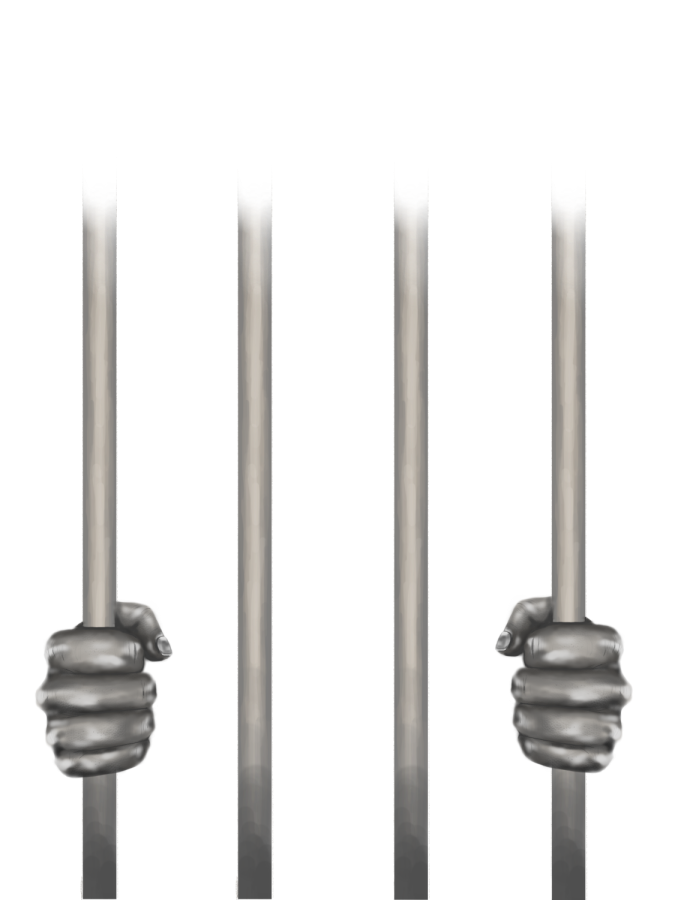Man in solitary confinement sues Louisiana correctional center citing cruel punishment
Illustration
October 8, 2022
Tomarcus Porter said that he is unable to exercise properly, treat his mental health, sanitize his environment or protect himself from harsh weather conditions while incarcerated in solitary confinement at Rayburn Correctional Center, according to a civil action lawsuit which he filed against the correctional facility in response to these conditions.
The lawsuit, recorded Sept. 9 in the Eastern District Court of Louisiana, was also filed against Head Warden Travis Day, Warden of Security Kevin Luper, and Rayburn’s Administrative Warden, Karla Wheat, according to the lawsuit’s official paperwork.
The suit’s paperwork further details Porter’s desperation. He claimed, in the lawsuit, that he attempted to report within the correctional center before deciding to file the suit as a final plea for justice.
“I ask the wardens for change, and we inmates on disciplinary segregation still have not gotten the right change,” Porter wrote in the lawsuit, referring to his being in solitary confinement.
According to the Louisiana state legislature, civil action lawsuits are official requests for the enforcement of a legal right. In his paperwork for the lawsuit, Porter specifically cites the Eighth Amendment to the United States Constitution as a reason for filing, since it outlaws cruel and unusual punishment.
A representative from Rayburn Correctional Center wasn’t immediately available for comment on the case.
Loyola University New Orleans’ Jesuit Social Research Institute recently partnered with Rayburn in order to provide college education to those incarcerated at the center.
Annie Phoenix, the executive director of Loyola’s Jesuit Social Research Institute said that the institute is involved with the Stop Solitary Coalition, a statewide group dedicated to ending the practice of solitary confinement within Louisiana prisons. Specifically, Phoenix said, Loyola is involved with the section of the group that focuses on reform through Catholic teachings. Although, she said that the program is not specifically involved with this case.
“We affirm the life and dignity of the human person and believe that we are one human family,” Phoenix said.
Porter said, in his lawsuit filing, that incarcerated people living in solitary confinement at Rayburn Correctional Center are supposed to have one hour of yard time per day, during which they can exercise outside. However, according to Porter’s filing, people incarcerated in his cell block are denied yard time if it is raining outside and instead must stay in their cells. Porter also said that, when they are let outside, he and other incarcerated individuals are kept in restraints which he argued limits movement, preventing effective exercise.
Porter said, in the suit, that not being able to exercise properly “causes health and cardiovascular damage to the human body.”
Additionally, according to Porter’s court filing, those incarcerated in cell confinement are only allowed one hour of yard time per week, while those not in cell confinement are often denied yard time based on the whims of guards.
He said that “most of the time, the officer will flat out refuse to put you on the yard.”
In his filing, Porter asked for adequate yard time without constraints so that he and others can properly take care of their physical health.
Additionally, in the records, Porter said that he and others have had limited access to mental health social workers. He said that psychiatrists make weekly rounds with the inmates but that beyond that, their care is limited. Porter wrote in the lawsuit filing that he believes that this is cruel due to the extreme stress solitary confinement has on the human psyche.
According to Louisiana on Lockdown, a 2019 report which Loyola’s Jesuit Social Research Institute contributed to, of the 2,902 people living in solitary confinement who were surveyed for this report, 60.8% said that they had been diagnosed with a mental illness before being isolated and 53.8% said that their mental state worsened while in confinement.
Those on watch for suicide, homicide, or other mental health concerns only have access to their mattresses and sheets when the correctional center deems it necessary, Porter wrote in the filing. The inmates also have no control over lighting in their cells, he said.
In his lawsuit, Porter asked that people incarcerated in solitary confinement have greater and more regular access to proper mental health counseling. He also asked that inmates on watch are able to keep their mattresses and sheets throughout the day “so that inmates can better themselves with the help of mental health staff,” he said.
Porter also asked that he and other individuals incarcerated in solitary confinement have access to televisions, magazines, books, and radios during periods of confinement, so that they may better occupy their minds and therefore mental health.
According to Porter’s filing, incarcerated individuals in solitary confinement at Rayburn are also denied proper hygiene. He said that they are only able to sanitize their living quarters four days out of the week and do not have adequate access to personal hygiene products.
He asked, in the lawsuit filing, that he and others be able to sanitize their cells daily and be given better access to commissary goods, such as shampoo, conditioner, soap, lotion, and deodorant.
Porter added that those incarcerated in solitary confinement are denied proper clothing and resources for harsh weather conditions, and that during hot summer months they have access to ice water only twice a day while other wings of the correctional center have their own ice machines, which can be used freely.
At the correctional center, people “will go into a dizziness state and pass out due to not being able to cool their bodies with ice water,” he wrote in the filing.
Porter continued that during cold winter months, inmates are not given extra clothing or bedding in order to keep themselves warm. Porter asked, in the lawsuit filing, that individuals in solitary confinement at Rayburn Correctional Center be given access to weather-appropriate clothing; this would mean jackets in the winter and shorts and tank tops in the summer. He also asked that they have greater access to ice and ice water.
Porter wrote in the filing that he believes that these conditions fall well within the scope of cruel and unusual punishment and that he filed this lawsuit in an attempt to invoke reasonable change.










Tim joseph • Oct 9, 2022 at 7:39 am
That’s not right how they treating those guys back there,sumthing need 2b done about that real fast….SMH
Elmer Simpson • Oct 8, 2022 at 8:10 pm
I don’t think I will be interested in that treatment, so I will just keep working and obey the laws of the land!
RL Litten • Oct 8, 2022 at 6:15 pm
If you want better conditions then go by the rules and you won’t be in solidarity! You are in prison for a good reason and I don’t think you should have any right for anything!
Richard Dickson • Oct 8, 2022 at 2:00 pm
Did 4 years In David wade correctional center cell blocks I feel your pain bro.. it’s hot asf back there and you can lose yourself behind them bars..stay strong my brother.. better days will definitely come💪🏾